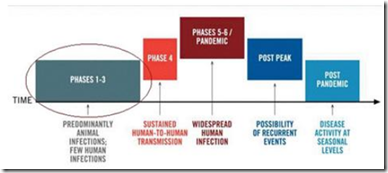Evaluations of the response to the 2009 pandemic have shown that the world is ill-prepared to respond to a severe influenza pandemic or to any similar global, sustained and threatening public health emergency.
From the lessons learned it can be concluded that existing country pandemic plans have a number of gaps. Member States are in the process of revising their pandemic plans and 4 countries of the WHO European Region have published their revised plans.
A key activity of WHO/Europe in collaboration with the European Centre for Disease Prevention and Control (ECDC) is to provide a strong and clear guide, so that all countries of the Region can revise their pandemic influenza preparedness strategies. To this end, the existing European guidance is being revised in line with revisions from the WHO global pandemic guidance. This new version of the European guide will be discussed during a workshop on pandemic preparedness that will be held 5-7 December 2012 in Copenhagen, Denmark for countries of the South-eastern Europe Health Network (SEEHN), newly independent states, Switzerland and Turkey.
The meeting is organized in collaboration with the SEE Regional Health Development Centre for Communicable Diseases Surveillance in Tirana, Albania and will be facilitated by experts from WHO collaborating centres at the University of Nottingham, United Kingdom and the University of Geneva, Switzerland as well as WHO headquarters.
Experts from ECDC and Centers for Disease Control and Prevention (CDC) Central Asian Region, Almaty, Kazakhstan will also participate.
For more information please contact: influenza@euro.who.int
From the lessons learned it can be concluded that existing country pandemic plans have a number of gaps. Member States are in the process of revising their pandemic plans and 4 countries of the WHO European Region have published their revised plans.
A key activity of WHO/Europe in collaboration with the European Centre for Disease Prevention and Control (ECDC) is to provide a strong and clear guide, so that all countries of the Region can revise their pandemic influenza preparedness strategies. To this end, the existing European guidance is being revised in line with revisions from the WHO global pandemic guidance. This new version of the European guide will be discussed during a workshop on pandemic preparedness that will be held 5-7 December 2012 in Copenhagen, Denmark for countries of the South-eastern Europe Health Network (SEEHN), newly independent states, Switzerland and Turkey.
The meeting is organized in collaboration with the SEE Regional Health Development Centre for Communicable Diseases Surveillance in Tirana, Albania and will be facilitated by experts from WHO collaborating centres at the University of Nottingham, United Kingdom and the University of Geneva, Switzerland as well as WHO headquarters.
Experts from ECDC and Centers for Disease Control and Prevention (CDC) Central Asian Region, Almaty, Kazakhstan will also participate.
For more information please contact: influenza@euro.who.int


Comment